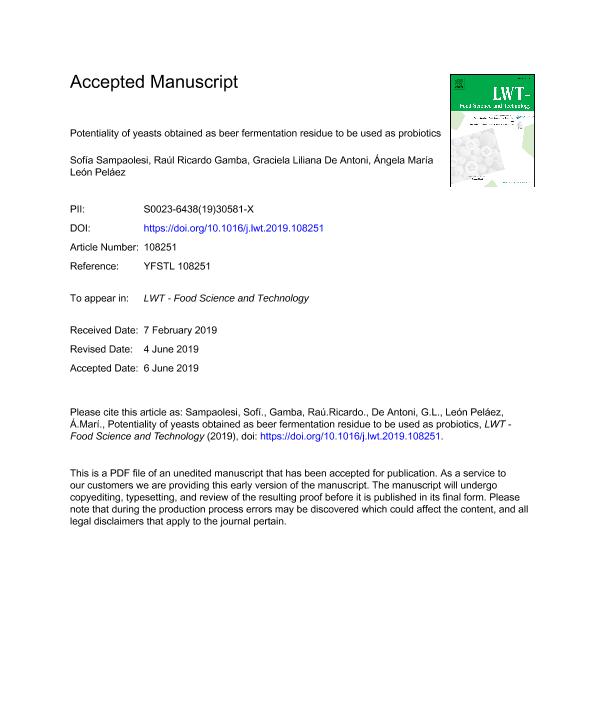Artículo
Potentiality of yeasts obtained as beer fermentation residue to be used as probiotics
Fecha de publicación:
10/2019
Editorial:
Elsevier Science
Revista:
LWT - Food Science and Technology
ISSN:
0023-6438
Idioma:
Inglés
Tipo de recurso:
Artículo publicado
Clasificación temática:
Resumen
Beer is the most consumed alcoholic beverage worldwide and brewery is a growing industry. Biomass by-product of beer production is constituted by viable and non-viable flocculated yeasts which are discarded. To increase the value of this waste, the potential applications of the beer fermentation residue (BFR) as probiotic and bio-preservative were studied. Strains isolated from commercial brewing starters and BFRs were identified. The M6 BFR and its constituent strains, Saccharomyces cerevisiae CMUNLPY6.2 and Pichia kudriavzevii CMUNLPY6.1, proved to be the most resistant to gastrointestinal conditions in vitro. The cell-free supernatants obtained from micro-fermentations were capable to reduce Aspergillus flavus and Aspergillus parasiticus germination, two species well-known to produce the potent carcinogenic aflatoxin B1 (AFB1). A cytoprotective effect of the BFRs against AFB1 on HepG2 cells was observed. Brewing yeasts bound AFB1 in vitro, thus reducing the cell damage induced by the toxin. Throughout the study, yeasts grown in brewing wort showed better probiotic properties than the same yeasts grown in YPD broth. These results suggest that the wastes obtained from brewery would become a high-value probiotic product.
Palabras clave:
AFLATOXIN B1 BINDING
,
BEER FERMENTATION RESIDUE
,
BREWING YEAST
,
PROBIOTIC
Archivos asociados
Licencia
Identificadores
Colecciones
Articulos(CCT - LA PLATA)
Articulos de CTRO.CIENTIFICO TECNOL.CONICET - LA PLATA
Articulos de CTRO.CIENTIFICO TECNOL.CONICET - LA PLATA
Articulos(CINDEFI)
Articulos de CENT.DE INV EN FERMENTACIONES INDUSTRIALES (I)
Articulos de CENT.DE INV EN FERMENTACIONES INDUSTRIALES (I)
Citación
Sampaolesi, Sofia; Gamba, Raul Ricardo; de Antoni, Graciela Liliana; León Peláez, Angela Maria; Potentiality of yeasts obtained as beer fermentation residue to be used as probiotics; Elsevier Science; LWT - Food Science and Technology; 113; 10-2019; 1-7
Compartir
Altmétricas




